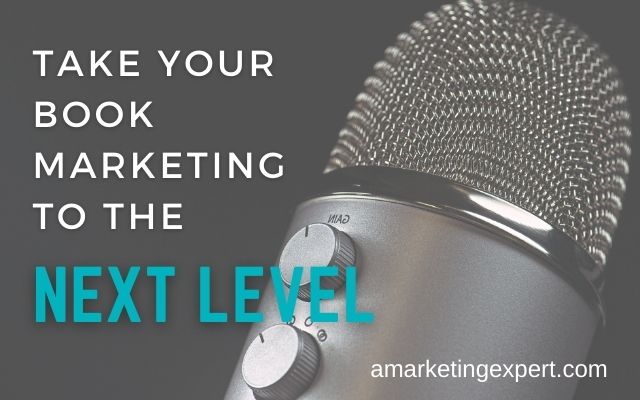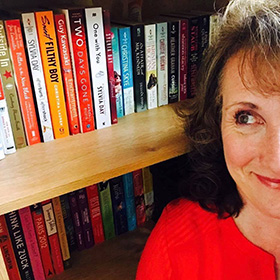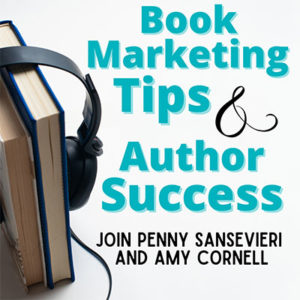Whatever your book marketing plan was for the past year, I can guarantee you that 2020 tossed a lot of unexpected elements your way. But one of the odd benefits of the pandemic was the ability to attend events all over the world – from the comfort of your living room or office. Zoom, of course, was the star for much of the year, and while video will always be a big player, audio is seeing somewhat of a golden era boom. Think podcasts, in particular, and now the new app everyone seems to be talking about: Clubhouse.
Audio is intimate. You’re in someone’s ear. It can be a great way to build rapport and build a dedicated fan base. Audio is also convenient because you can be doing other things while listening to something, like a podcast or an audiobook for example. The convenience factor is a huge part of the growth of audio, in general. You don’t have to read or watch. You can just listen. This adds a different level of “ease” when it comes to getting more people to your book marketing message.
So let’s dig into some ways you can incorporate the audio tools out there into your book marketing plan. Some you know, but a few you won’t.
Introducing a Brand-New Social Media Platform – Clubhouse
The concept of this social media is really easy – get on and talk. Ideally, you aren’t doing a bunch of self-promotional segments. Find something that’s helpful to others – talking about the research you did for your historical fiction or share some snackable ideas from your non-fiction book.
I like Clubhouse because you aren’t tethered to being on video. You can just grab your phone and start speaking or listen to others. To get started, I recommend joining some groups and listening to how other sessions are formed. Then, by all means, jump in when you’re ready!
Getting Creative With the New Audio Feature on Spotify: If you aren’t quite ready to jump into podcasting or audiobooks, you could create your own. Spotify has partnered with Anchor.fm to create music and talk stations. Meaning you can read from your book, or share something about your book that’s inspiring. Incorporate some unique and creative approaches into your book marketing plan. You could also dig into some of the history around the time your book is set and pair it with music, check out some other talk and music blends here: https://bit.ly/2OluIa2
Starting a Podcast
Obviously, this is the biggest and one of the longest-running trends in audio. And as we know, podcasting has really exploded in the last few years. Running a podcast, while fun in theory, takes a lot of work but can be an effective method to add to your book marketing plan. We’ve been running our book marketing podcast since February of 2020 and it’s a lot of very focused effort. Yes, the equipment is important, but sticking to a schedule, especially when you have a lot going on, can be tougher.
![Stay with me here: the best book marketing campaigns include social media AND it is also true that social media doesn’t sell books. Wait, what? Isn’t that a contradiction? You’d think so but here’s the thing: social media is an important key to exposure, and exposure sells books. Let me rephrase that: the right kind of social media sells books. Which is why I always say it’s not about being everywhere, but everywhere that matters. There are a lot of different angles to consider with social media platforms, and you can get deep into which platform is best for your purposes as well as all kinds of analytics that can guide when and where you post. These are all worthy topics for advanced study. Today we’re going back to basics as we consider the best book marketing campaign for you. Today’s post, in fact, is all about helping you answer a question many authors struggle with: what the heck am I supposed to post? Authors often hop on social media sites without any idea of the demographic of the platform’s users, with no knowledge of their own reader demographic, and without the faintest idea of what to say – and then they wonder why social media doesn’t seem to be working for them. That is not the right way to approach social for your best possible book marketing campaign; not only is it wrong, but that approach will cost you a bunch of time and effort that you literally will never get back. Where Does Your Message Live on Social? Most of the time, social media frustration stems from authors struggling with the content they feel they should be posting. In response to the feeling that they should be active on social media, they post something that’s not really relevant to their audience, though maybe it’s top of mind. But the problem actually starts earlier than that because more often than not, authors are on the wrong social media site to begin with. I’m including a link to a social media quiz you can take, to determine the best site for you (see the Resources section below). And if you take the quiz and you’re sitting here thinking “Well great, I’m on all the wrong social media sites, what do I do now?” My answer is: close down what you don’t need. If you keep the account, you’ll be tempted to update it, and that’s not a good use of your time. If you keep the account and don’t update it, it looks like you’ve abandoned your own party, and that’s not a good look either. Creating a Rockin’ Social Media Presence It’s fair to say that each social media site has its own particular “needs” – LinkedIn, for example, is different than Facebook, which is different from Instagram or Twitter. But regardless of where you’re going to spend your time, you’ll want to make sure to do a little bit of prep work before you start posting. Authors with the best book marketing campaigns work on identifying the talking points that will work best for them and for their books. To make this easy, I recommend you find three or four tracks you will speak to. These “tracks” are the conversation funnels you share on social, and the reason I like to limit those tracks is that a narrower course makes it easier for you to figure out what to say and/or share. Generally what happens is authors hop onto social and share whatever comes to mind, which creates a somewhat erratic presence and, invariably, lowers your engagement. What you’re attempting to do here is set your reader expectations by pre-plotting your pathways and the things you share. This doesn’t mean that you’re always tied to just four talking points, but to get started and kick this into high gear, you’re better off staying on track. And, by staying consistent to your messaging and your posting topics and schedule, you’ll build a reader/follower base much more quickly than you would if you just got onto social media in a haphazard way or if you posted too much one day and then nothing at all for a week. Most of what happens on social media falls into one of those two scenarios. So what does this look like in the best book marketing campaigns? Let’s say you’ve written a diet and health book; your tracks might look like this: • Latest health news • Quick daily health tip • Exciting news about your book • Motivational quote around health/wellness/diet If you’ve written a fiction book, let’s say a Sci-Fi novel, your tracks might look like this: • Fun science fiction did-you-know • Throwback to old Sci-Fi novels, shows, or films • Exciting news about your book • Book research you’re doing for future books OR • Some insight into your life: where you write, the playlist you listen to when you write, etc. OR • Your hobbies and what you love to do besides writing We worked with an author who set one of her romance novels in a small town, so she shared recipes from the various restaurants and coffee shops she wrote about, and readers really enjoyed this creative twist. She tried to create an immersive experience because she knew that was what her readers really cared about. So, along those lines you could share cocktail recipes or anything that tethers to the world you’ve created. Here are some other ideas: • Get your followers’ help in naming a pet in your next book. • Even better, get their help naming a character! • Ask questions to get to know your followers better; people love it when you ask about hobbies or movies they love. • Talk about things you like besides books. • Make yourself unique. • Share things that are specific to your genre – for example, if you wrote a book on vampires, you could create a meme with four famous movie vampires and ask readers to pick their favorite. • Celebrate your favorite comfort food or something else that dials into your topic. The idea is to find where readers want to engage – meaning posts that will (in the words of Marie Condo) spark joy with your followers. This may take a while. Start with your three or four discussion tracks but know that you may need to play around a bit and further refine them. The Best Book Marketing Campaigns Create Connections Readers love getting to know the authors of the books they read and love. Often, authors post on social and then wait for folks to engage with them, and yes, a bit of that approach can be part of your social platform mix. But also know that the degree to which you are connected to your posts matters, and it matters a lot. If you’re posting and ditching, you won’t get good engagement – ever. After you post, you need to check back to see if anyone responded; sometimes it just takes one person response, followed by your own, to get the comments rolling. Humans desire social approval; we love to express ourselves on social media in the hope of getting affirmative feedback. Likes and shares give our brains a surefire dopamine rush. We also love contributing and having our opinions heard – keep this in mind even if you’re just posting something funny. For example, I do a lot of “caption this” posts to spark communication. Some of them do really well, garnering upwards of 150 comments, while others only get 20 or so comments. Regardless of how many responses I get, I make sure to acknowledge every single one. People love it when you take the time to get to know them, when you’re really interested and willing to take the time to connect. Inviting followers to share their hobbies and then responding – or even just giving their content a thumbs up – can go a long way in developing reader relationships. Another driver of engagement is nostalgia, though you need to know your audience well enough to make it work for you. Someone who grew up in the 1990s won’t necessarily feel nostalgic for the same post as someone who grew up in the 1970s. People also love humor, especially now. So posting funny things might be one of your tracks. As I said before, you’re going to want to play around with this a bit until you find the right mix. Branded Images The best book marketing campaigns use images that are consistent in color, font, and message. You may share a meme that’s not specifically branded to you, which is fine. But the majority of your images should be consistent with your brand as this helps to create a visual recognition; readers see something and say, “Oh that looks like [insert author name]!” You can create branded images using an online service like Canva. In fact, for AME’s blog images (which get shared on social), we create a series of templates so that we can swap images in and out, but the standard font, spacing, and URL stay the same. Canva is an easy way to quickly create content, too. Create a Posting Calendar The best book marketing campaigns rely on planning. Not everything you do has to be planned ahead of time, but keeping up with your social media obligations will be a lot easier – and quicker! – if you create a posting calendar so you know what you’re sharing and when. Once your plans are in place, you might also spend some time creating images ahead of your posting dates and then scheduling them to post. This allows you to really focus on marketing strategies like book giveaways so you aren’t caught off guard when your chosen date crops up. Staying the Course Social media takes time. You’ll try something and succeed, then try something else and fail. This is how you learn what resonates with your audience, and what does not. Before long, you’ll start to see why social media plays such an important role in the best book marketing campaigns. And you might even start to discover some real joy along the way! Resources and Free Downloads Canva Monthly Book Marketing Planner Book Marketing Kickstart Package QUIZ: How to Market Your Book on Social Media](https://amarketingexpert.com/wp-content/uploads/2020/06/CTAs-3.png)
If you’re thinking of doing a podcast, don’t overshoot this by saying “I’ll do this once a week” unless you really know you’ll have the time. Because once the episode is recorded, it’ll need to be edited, you’ll need intro and outro music, etc. This is by no means mean to discourage you. We *love* doing our show and I’d never want to stop recording it, but it takes more time than you realize. And when it comes to how to market a book – consistency is key. Whatever you start, make sure you’re ready to keep it going. So if you’re up for it, by all means add this to your repertoire of things you do for your book promotion.
Getting Into Audiobooks
Much like podcasting, audiobooks have been around for a while. If your budget allows, and the market is really right to turn your book into an audio version, maybe it’s time to consider that, too. And what do I mean by “market is really right”? Well, I mean that not all books should be audiobooks. My books, for example, tend to be image and link-heavy, so turning them into an audiobook doesn’t make a lot of sense. Which is why I started a podcast. Because I can pick the elements that don’t require lots of imagery and expand on those.
But for business books, fiction, historical fiction, memoir, you name it – audiobooks can be really fantastic. Not sure if your book would be great in audio? Check out your genre on Amazon and see what other, successful authors are doing – it’s a great way to figure out whether you need this, and it might give you some additional ideas on how to market a book, too!
Your Book Marketing Plan – Picking the Right One for You!
With all of these options, where do you start? Well, I recommend picking at least one. If you’re interested in Clubhouse, by all means, get in there. It’s by invitation only right now, but you might be surprised how easy it is to get someone to invite you. Get started by setting up your account and then there’s a good chance someone will recognize your name and invite you in (yes, that’s actually how it works – right now at least).
If you think you’re up for something bigger, maybe a podcast or audiobook is more to your liking. Whatever avenue you decide to incorporate into your book marketing plan, I would love to hear your feedback on how it worked.
Resources and Free Downloads
What Authors Need to Understand about Different Book Publishing Options
How to Promote a Book in 2021: Smart Ways to Plan Your Book Marketing Goals in the New Year





0 Comments
Trackbacks/Pingbacks